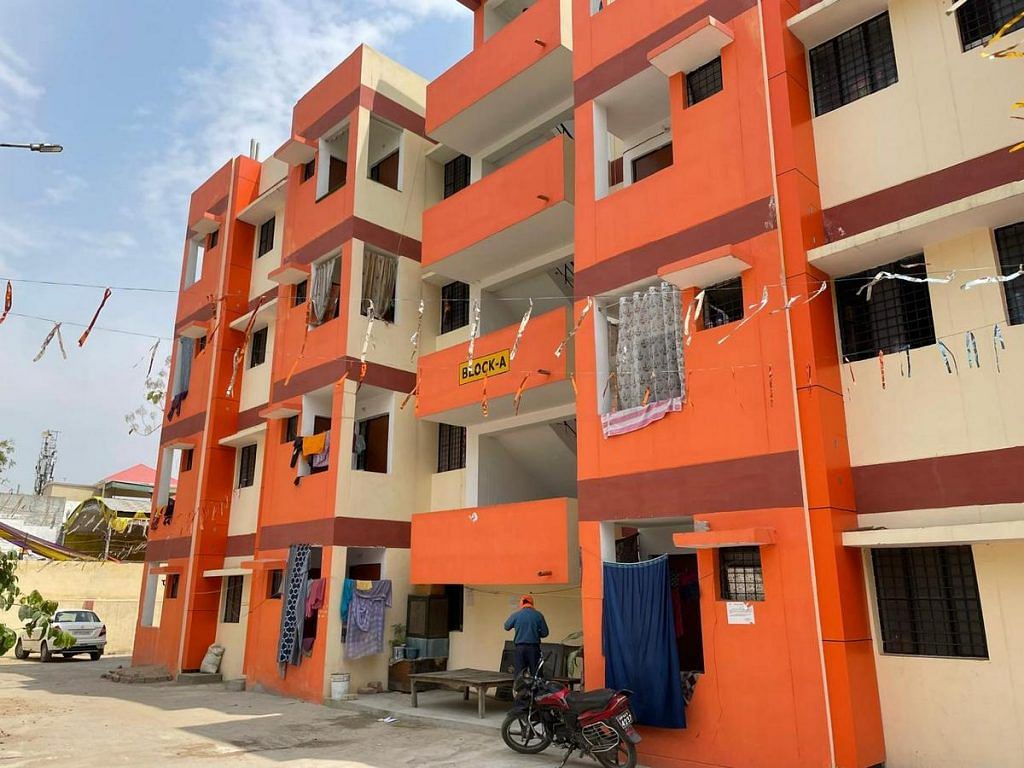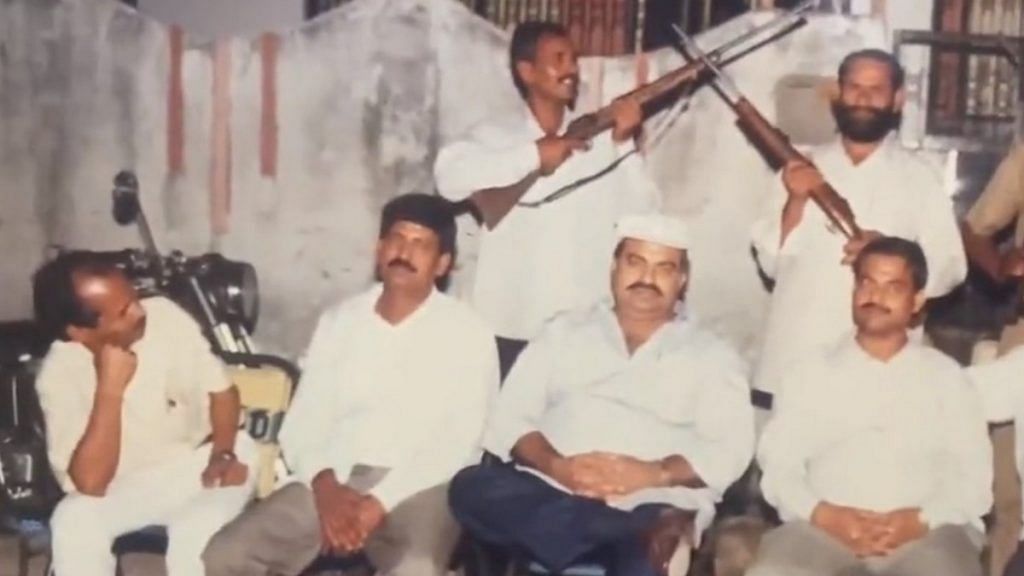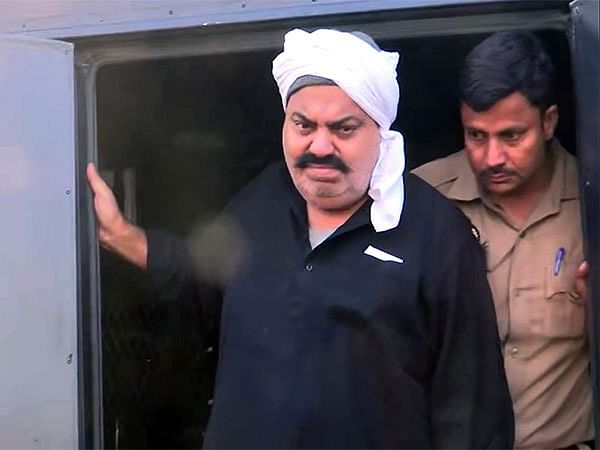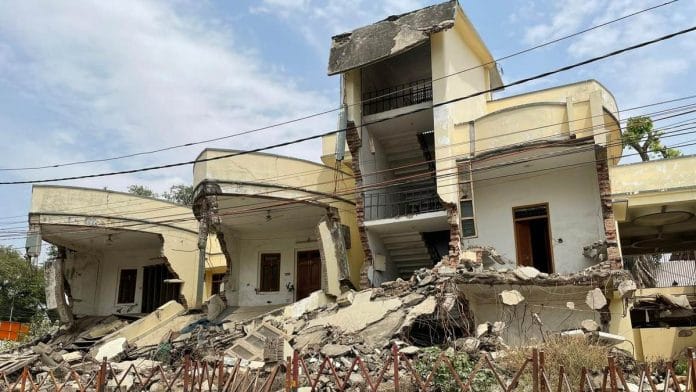Prayagraj: Along the main road in Prayagraj’s Chakia, a locality for years associated with slain gangster-politician Atiq Ahmed, lies the rubble of the once grand mansion that housed his office, locally called ‘Sansad ji ka darbar’ (MP’s court). The rubble has been lying in the same spot for over three years now.
A few kilometres away, there are more piles of rubble, littering the landscape every few yards. These are all that’s left of the houses of former MP and MLA Ahmed, his brother Ashraf, and other aides. Until a few years ago, these structures stood tall, brazen testaments to Ahmed’s unchecked power. Now, they are the vestiges of Prayag’s era of “gangster raj”, decisively ended under the rule of Uttar Pradesh Chief Minister Yogi Adityanath.
Ahmed, who was convicted for kidnapping, was shot dead live on TV last April along with his brother, Ashraf, in April last year while the two were under police escort.
A year after his death, the city has become a museum of his obliterated empire, but it’s not just piles of debris. The main exhibit is the bright, saffron-painted housing complex made for the poor under the Pradhan Mantri Awas Yojana on land confiscated from Ahmed in the Lukuarganj area of Prayagraj.
“The land on which the gangster one tied his horses is now being used to house 76 poor families in Prayagraj,” Dinesh Tiwari, a local BJP politician, proudly claimed.

“We got this house about a year ago,” said Rani Khan, a member of one of the seven Muslim families who received houses in the complex. “We could never have dreamed of living in such an elite neighbourhood. My previous house had no electricity, and we’d bump into each other whenever there was a power cut.”
Khan claimed Atiq Ahmed made no impact on her life. “He neither troubled us nor helped us. He probably bothered those who owned land and property, but had nothing to do with poor people like us,” she said. “But he owned such large swathes of land. If he’d wanted, he could have them to people, Muslims. But he never did.”
However, Khan’s lack of run-ins with Ahmed could be a function of her socioeconomic class. The upper middle class and the rich of Prayagraj often have a different story to tell.
Also Read: How Atiq Ahmed’s inner circle turned on him — filed FIRs, ‘used his name and pocketed profits’
‘Strong state & Robinhood cannot coexist’
There was a time when it was impossible to buy property in Prayagraj without paying a “goonda tax” to Atiq Ahmed’s “gaddi”, said Naresh Kushwaha, a local businessman.
Across the city, residents referred to Ahmed and his ‘system’ as gaddi— a term derived from his Gaddi Muslim community, traditionally associated with cattle farming. This influence was so entrenched that it became a central issue in Prayagraj West constituency in the 2017 assembly election. BJP candidate Sidharth Nath Singh’s main campaign promise was “Main gaddi ko raddi karne aaya hoon (I have come to destroy the gaddi system)”. The seat (formerly called Allahabad West) was once a bastion of Ahmed, who was elected as MLA five consecutive times since 1989.

“I myself paid goonda tax when I bought my house a decade ago,” said Kushwaha. “It could be anything between 10-15 percent, but you had to pay or his men wouldn’t let you complete the construction. Across the city, several apartments were built but the builders could not sell them because of the gang. There was a time when they owned hundreds of crores worth of property in Civil Lines alone.”
Such was his stature that when there would be power cuts, Ahmed would arrange for generators even for police stations, Kushwaha said. “There was no bigger thana than his house in Allahabad.”
Ravi Gupta, who owns an electronics shop in Prayagraj West, agreed. “If they wanted a piece of land, they wanted it. Paise se ya bandook se (they would take it with money or the gun)—there couldn’t be any questions asked,” he said. “So, of course, there is a sense of relief in the city. People can buy property, do business with much more ease.”
However, Gupta claimed that the gaddi system hasn’t been completely eradicated.
“Even now, there are people who extort in the name of gaddi. Extortion still happens in the city. But the pervasive sense that one has to necessarily pay the gangster to get anything done has gone,” he said.
A strong state and a “Robinhood” can never exist together, according to Yogeshwar Tiwari, a former head of Allahabad University’s history department.
“The state under the Yogi government is strong and, therefore, there is no space for a Robinhood figure like Atiq. Such figures are bound to get isolated, if not eliminated,” he said.
But even a year after Ahmed’s death, there are properties across the city that are yet to be acquired by the government. “Over the last few years, we have attached property worth around Rs 500-600 crore,” said DCP City, Deepak Bhuker. “Even now, there are more to go. For instance, crores of Waqf land were seized by them (Atiq’s gang). That is yet to be acquired.”

The modus operandi of the gang, he confirmed, was to grab land and take goonda tax even from legal owners.
“You can imagine what it did to the psyche of the general middle-class person, who used their lifelong savings to buy a piece of land,” Bhuker added.
An official in the Public Development Authority (PDA) said on condition of anonymity that the government plans to convert Ahmed’s office property into a government facility, perhaps to store EVMs. Moreover, he added, a part of the land where Prayagraj’s sprawling new National Law University is coming up, was also confiscated from Ahmed.
“There have been over 60 properties of mafia demolished in Prayagraj, and the government will slowly build new homes, offices, buildings for public use in most of them,” the official said.
An uneasy quiet in Chakia
Even a year after Ahmed’s death, both his detractors and supporters are hesitant to speak about him openly. Detractors say they fear retaliation from his sons, two of whom are still minors. Supporters, on the other hand, are apprehensive about the police.
Many among them are underprivileged Muslims who claim that Ahmed helped them when no one else would.
“Nobody will talk about Atiq here,” said a Muslim shop owner in Chakia, asking not to be named. “What we have to say about him is different from the police. He actually helped the poor a lot, he had a heart of gold. We all know why he was killed and not so many other gangsters.”
Iqbal Ahmed, another grocery shop owner, agreed. “He was a Robinhood kind of figure. Many years ago, there was a pull made here in Chakia because of which some people were displaced. He rehabilitated each one of them,” Ahmed said. “At the time of Ramzan, he would distribute lakhs of rupees among the poor. On Dussehra, he would get a mela organised. In Pritam Nagar, he donated lakhs of rupees for a Baudh Mandir. He hated anyone who would think communally.”
Atiq Ahmed’s popularity among the Muslim community was shaped by larger sociopolitical forces, said a history PhD candidate at Allahabad University, who belongs to the Muslim community and grew up in the city.
“He emerged in the late ’80s, when Hindutva was on the rise. Increasingly, as the Congress party and Muslim religious leaders lost their credibility among Muslims as their representatives, we saw the rise of these Muslim gangster-cum-messiahs who the community began to trust,” the PhD student said. “People like Atiq point towards the structural alienation of Muslims from mainstream politics. Their (gangsters’) politics was not black or white. It was messy, bloody, but also very pro-poor.”
(Edited by Asavari Singh)







irrespective of religion, a rogue is a rogue, a gunda is a gunda and surely they’re to be punished by law… if he was doing this tax collection what were the police and administration doing? why inaction from police, govts, courts? trust me, across india, even today we have so many such goondas collecting goonda tax during construction or buying a new house in many cities.. we the people are used to it and continue to not mingle with the police complaints as it would make our lives a hell.. the police doesn’t do anything, the govt. doesn’t do anything, the goondas are supported by so called bigger goondas – politicians…